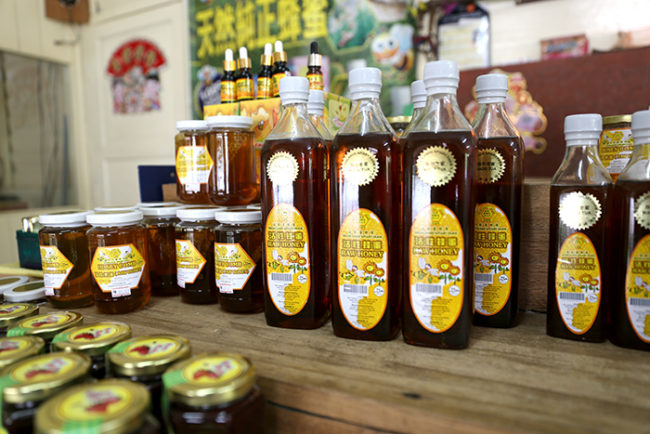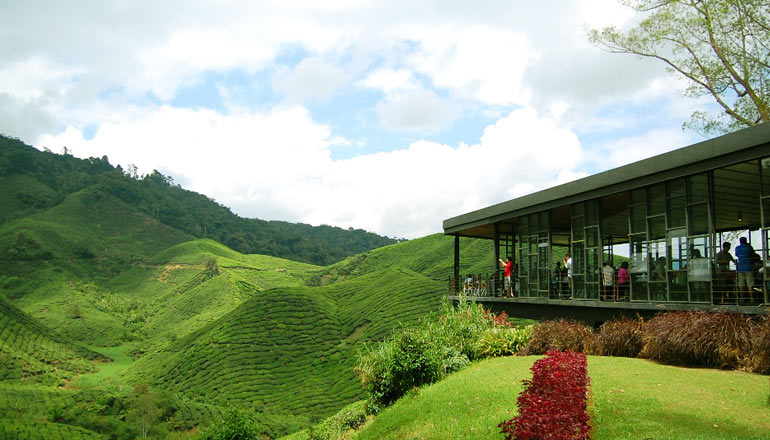
The
Cameron Highlands is one of the few places in Malaysia that serves as a
habitat for a wide variety of flora and fauna. There are more than 700
species of plants that grow here. The vegetation changes as one ascends
the mountain. The ward is known for its tea growing, vegetable farms and
flower nurseries. Its woodlands form the prevailing natural
ecosystem within and around the prefecture.
Besides its flora, the district is also a shelter for a wide variety of
animals, birds, reptiles and insects. Of these, the Sumatran serow,
mountain peacock-pheasant and Malayan whistling-thrush are listed in the
2004 IUCN Red List of Threatened Species.
Geographically, the resort is located on the highland of Peninsular
Malaysia. It owes its present standing to its location at a high
altitude (generally between 800 metres (2,600 ft) to 1,603 metres (5,259
ft) above sea level)
INTERESTING
PLACES TO VISIT :
1.
Tea Plantation.
BOH Tea Plantation is a must-visit place
when you are in Cameron Highlands Scenic, tranquil & cool fresh
air! The road journey to the BOH Tea Plantation is quite an adventure
itself. Boh Tea Plantation has a total of 8000 acres planted with tea.
The largest tea plantation in Southeast Asia. Road is narrow and
winding. Do give a honk or two while negotiating a corner to let
oncoming traffic know there is a car coming. Gets kind of fun to honk
the horn after a while!
Put narrow roads aside,the view of
green rolling hills, with the neat regular rows of tea plants, is
truely breathtaking & refreshing ! Many a times, you may want to
stop your car, and just walk in the tea plantation and pick some tea
leafs yourself!
The Sg Palas 'ummph!' BOH Tea
Plantation offers a FREE guided factory tour of how the tea leaf is
processed. Don't forget to visit a very nice BOH Tea Shop nearby &
pamper yourself with a nice cup of tea, cakes & enjoy the
enchanting ambience & view of the BOH Tea Plantation !
2.
Strawberry Farm
Cameron
Highlands is the center of strawberry production in Malaysia - along with
tea plantations and vegetable markets, strawberries are an iconic part of
the landscape comprising this resort destination. The cold climate makes
it suitable for cultivating strawberries all year round throughout the
highlands, with most farms concentrated at Tanah Rata, Brinchang and Kea
Farm.
When in season, many of these farms offer strawberry picking by hand to
attract visitors. The popularity of this dainty fruit has also spun a
bustling cottage industry that churns out souvenirs, pillows, clothing,
keychains, toys and other merchandise in the shape and theme of
strawberries. In local cafes and restaurants, it is a trend
to incorporate strawberries in the menu, whether as ingredients for a dish
or a choice of flavour in pies, cakes, ice cream, waffles, chocolate and
drinks. As the fruit does not keep for long, stock that goes unsold at
farms and markets is processed into jams, pickles, biscuits and other
treats for sale as dry goods.
As the strawberry plant grows ideally in cold but dry conditions, the best
time to enjoy fresh strawberries is from May till August - months with the
least rainfall. In Cameron Highlands, strawberries are grown by hydroponic
method in greenhouses to allow for high volume and quick production rates.
The plants are placed in soil bags or pots and stacked on racks, the
greenhouses keeping them dry.


3.
Bee Farm
Bee
farms are a novelty in Cameron Highlands, producing a modest range of
delicious honey and derivative products for sale and show to visitors.
The bee farms are located in Ringlet (Highlands Apiary Farm), Brinchang
(Ee Feng Gu Bee Farm) and Tringkap (Cameron Tringkap Bee Farm), with
slight variances in size, facility and scale of honey production.
Free
to enter, these farms often combine their primary attraction with
strawberry picking, souvenir shops, vegetable markets and interactive
activities for children. As local bee populations are not enough to
sustain local supply, honey sold here is also sourced from wild and
domestic sources all over Malaysia.







